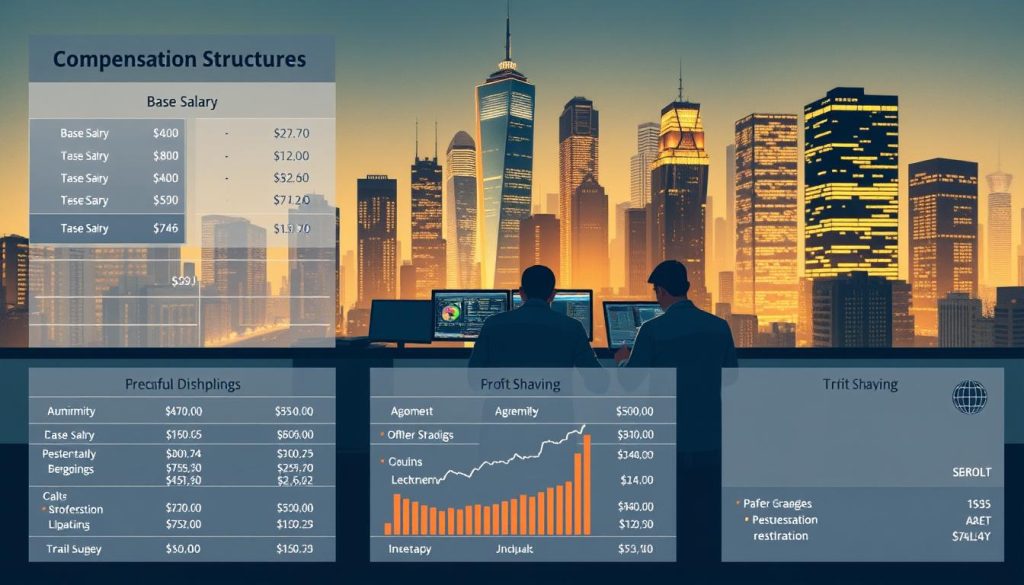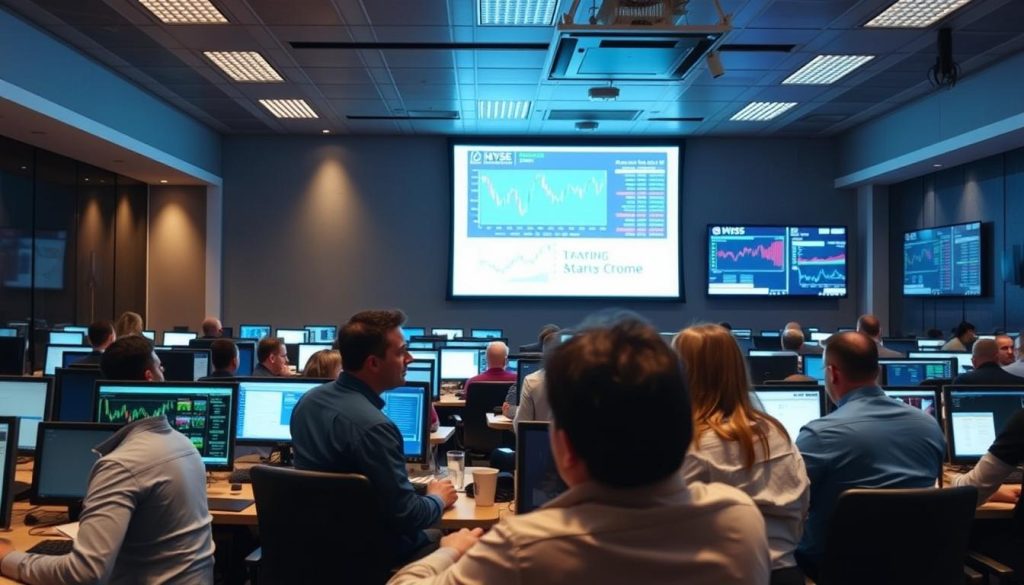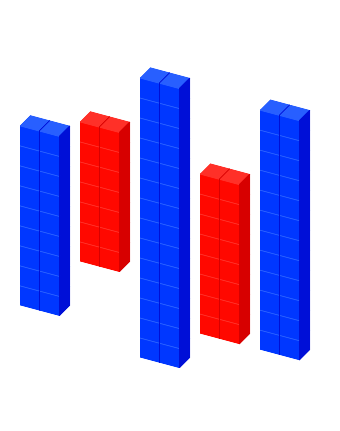The financial world is changing fast. Prop trading firms are now a big deal for traders wanting new career paths. Local firms offer special chances for those wanting to use their skills in fast-paced markets.
Looking for prop trading firms near you? They open doors to smart financial plans and big money-making chances. These firms use their own money, so traders can make profits without losing their own cash.
To get into local prop trading, you need to know how these firms work. You should understand their ways of making money, how they pay, and how they help you grow. Traders looking for local prop trading can find strong ways to make money.
Key Takeaways
- Prop trading firms provide unique investment opportunities
- Local firms offer direct mentorship and networking advantages
- Proprietary trading represents a dynamic career path
- Professional development is integral to prop trading success
- Strategic market knowledge drives trader performance
Understanding Proprietary Trading: A Comprehensive Overview
Proprietary trading firms have changed the financial world. They offer skilled traders a chance to use advanced strategies. These firms use their own money for traders to make profits through smart investments.
The world of proprietary trading has seen big changes. Modern prop trading firms now use the latest technology and smart trading methods.
The Evolution of Prop Trading
Proprietary trading has moved from old-school floor trading to digital platforms. Important steps include:
- Switch from manual to algorithmic trading
- Adding machine learning and artificial intelligence
- Opening up global markets
- Creating tools for quick risk management
Key Components of Proprietary Trading
Good proprietary trading firms have a few key things:
- Advanced Trading Strategies: Using complex algorithms and market analysis
- Strong Risk Management
- Top-notch Technology
- Keeping traders up-to-date with education
Modern Prop Trading Landscape
Today’s proprietary trading firms are very advanced. They use the latest tech to give traders powerful tools. The focus is on making decisions with data, fast execution, and careful risk assessment.
The future of prop trading is in new tech and understanding markets.
Prop Trading Firms Near Me: Finding Local Opportunities
Looking for local prop trading firms can change your trading career. These firms offer unique benefits that help you grow faster. They also provide more personalized training.
- Leverage professional networking platforms like LinkedIn
- Attend local financial industry meetups and conferences
- Connect with university career centers specializing in finance
- Research regional financial districts and trading hubs
Local prop trading firms have benefits that big companies can’t match. Being close means you get direct mentorship, quick communication, and tailored training.
“Location can be a critical factor in your trading career trajectory” – Financial Career Experts
To find local prop trading opportunities, try these steps:
- Map financial centers in your area
- Explore regional trading ecosystems
- Network with local financial pros
| Location Type | Networking Potential | Career Opportunities |
|---|---|---|
| Major Financial Hubs | High | Extensive |
| Regional Financial Centers | Medium | Moderate |
| Smaller Markets | Low | Limited |
By carefully searching for prop trading firms near you, you can find great opportunities. This will help you succeed in the competitive trading world.
Benefits of Joining Local Proprietary Trading Companies
Looking into proprietary trading firms near me can open up big career chances for those starting out. Local prop trading companies have special benefits that help you grow fast and build a strong base in the trading world.

For those wanting to make it big in finance, prop trading companies are a goldmine. They offer a place where you can learn, get support, and grow professionally.
Direct Mentorship Advantages
Local prop trading companies give you a chance to get direct mentorship. Experienced traders give you one-on-one advice, helping you:
- Develop smart trading strategies
- Understand the complex market
- Learn how to manage risks
- Get the inside scoop on the industry
Networking Possibilities
Being close to local prop trading companies means great networking chances. You can connect with:
- Professional traders
- Financial analysts
- Investment pros
- Potential career mentors
Career Growth Potential
Local proprietary trading firms offer clear paths for career growth. They help you improve your skills and increase your earnings. The close community lets you learn fast and move up in your career.
Success in trading is not just about individual performance, but about continuous learning and professional growth.
Essential Requirements for Prop Trading Positions
To start in proprietary trading, you need a special set of skills and background. Aspiring traders must be ready with a wide range of qualifications. These go beyond what you learn in a typical finance job.
For prop trading jobs, you usually need:
- A Bachelor’s degree in finance, math, economics, or similar fields
- Strong skills in numbers and analysis
- Deep knowledge of financial markets
- Good at statistical analysis and coding
Technical skills are key to getting proprietary trading jobs. You must show you’re good at:
- Advanced data analysis
- Managing risks
- Using trading platforms
- Creating algorithmic trading plans
Firms look for certain personality traits in candidates. These traits show if someone might do well in trading:
| Trait | Importance |
|---|---|
| Emotional discipline | High |
| Quick decision-making | Critical |
| Analytical thinking | Essential |
| Stress management | Crucial |
Getting professional certifications like the Series 7 and Series 63 can really help your chances in prop trading jobs. Always keep learning and being open to change is vital for success in this fast-paced field.
Top Proprietary Trading Firms in Major U.S. Cities
Proprietary trading firms are key in the U.S. financial world. Those looking for prop trading firms near me can find great chances in big cities. These firms offer special benefits for traders starting or growing their careers.

Each area has its own trading scene, offering different chances for traders. Let’s look at the top trading spots in the country.
East Coast Trading Powerhouses
New York City is the heart of financial trading, with many top firms. Traders can find amazing chances in these powerful financial spots:
- Jump Trading in New York City
- Citadel Securities in Chicago and New York
- Two Sigma in Manhattan
Midwest Trading Centers
The Midwest is a strong place for prop trading firms, with Chicago being a key financial center:
- DRW Trading in Chicago
- Peak6 Investments in Chicago
- XR Trading in Chicago’s financial area
West Coast Trading Opportunities
The West Coast, especially Silicon Valley, is a big hub for new trading firms. They mix tech with financial know-how:
- Quantitative trading firms in San Francisco
- Jane Street’s West Coast operations
- Automated trading companies in Los Angeles
Traders looking at these areas can find many chances that fit their skills and goals. Each place has its own perks, from the latest tech to special trading methods.
How to Evaluate Local Prop Trading Firms

Choosing the right prop trading companies is crucial. Local firms offer great chances for traders to grow. Knowing how to check these firms can really help your career.
When looking at local prop trading firms, focus on these key points:
- Financial Stability: Look at the firm’s money health through financial statements
- Technological Infrastructure: Check the trading platforms and tools they offer
- Performance Track Record: See how well they’ve done in the past
- Training and Development Programs: Look at what they offer for growing your skills
Here are some ways to research prop trading companies:
- Do online research about their reputation
- Talk to current and past traders
- Go to industry events and conferences
- Ask for interviews with the firm’s team
Local prop trading firms are different in many ways. Look at how they handle risks, pay their traders, and help them grow. A detailed check will show you the best place for your career.
“The right prop trading firm can accelerate your professional trajectory” – Trading Industry Expert
Compensation Structures in Prop Trading
Proprietary trading jobs have unique financial setups. These setups are different from regular jobs. Prop trading jobs near me often have special payment plans.

Prop trading pays based on how well you do. This means skilled traders can earn a lot.
Profit-Sharing Models
Profit-sharing is key in prop trading pay. It includes:
- Performance-based profit splits
- Tiered revenue sharing percentages
- Individual trading results determination
Base Salary vs. Performance Pay
Most firms focus on how well you trade, not just a salary. You might get:
- Minimal base salary
- Significant bonus potential
- Direct correlation between trading performance and income
Additional Benefits and Incentives
Firms also offer great benefits to attract the best. These can be:
- Advanced training programs
- Technology access
- Professional development resources
- Risk management support
Good prop traders see pay as more than money. It’s about growing professionally too.
Training Programs and Development Opportunities

Prop firms know how key good training is. They offer chances to learn and grow. These firms spend a lot on training to help people become top traders.
Good prop trading firms have many training levels. They help traders at all skill levels. This training gives them an edge in the fast-changing markets.
- Initial Onboarding Training
- Advanced Technical Analysis Workshops
- Risk Management Certification
- Psychological Trading Resilience Coaching
There are many ways to grow in prop trading:
- Mentorship programs with experienced traders
- Simulated trading environments
- Regular performance feedback sessions
- Access to cutting-edge trading technologies
Interactive learning platforms have changed how we learn. Many prop firms use advanced simulators. These tools let traders try strategies without risking money.
| Training Component | Duration | Focus Area |
|---|---|---|
| Technical Analysis | 4-6 weeks | Market Pattern Recognition |
| Risk Management | 2-3 weeks | Capital Preservation Strategies |
| Trading Psychology | 1-2 weeks | Emotional Intelligence |
To do well in prop trading, you must keep learning. The best traders see training as a never-ending journey. They always work on improving and staying up-to-date with the market.
Technology and Tools Used in Modern Prop Trading
Prop trading companies use the latest technology to stay ahead in the financial markets. The tech used by these firms has changed a lot. Now, they have systems that help traders make quick, informed decisions.

Today’s prop trading firms have a wide range of tools. These tools improve trading and help manage risks. They give traders important insights and tools to work with.
Essential Trading Platforms
Top proprietary trading firms use special platforms. These platforms offer:
- Real-time market data streaming
- Advanced charting capabilities
- Customizable trading interfaces
- Low-latency execution
Analytics and Research Tools
Advanced analytics are key to success in prop trading. Traders use powerful tools like:
- Predictive modeling software
- Machine learning algorithms
- Complex statistical analysis platforms
- Economic data integration systems
Risk Management Systems
Prop trading companies use strong risk management tech. This tech helps protect investments and improve performance.
| Risk Management Feature | Functionality |
|---|---|
| Real-time Position Monitoring | Tracks trading positions instantly |
| Automated Stop-Loss Mechanisms | Limits potential trading losses |
| Comprehensive Portfolio Analysis | Evaluates overall trading strategy performance |
The tech in prop trading keeps changing. It’s now more important than ever for traders to use advanced digital tools. This is how they achieve financial success.
Remote vs. On-Site Prop Trading Positions

The world of proprietary trading has changed a lot lately. Now, traders can choose between working from home or in an office. This change is great for those looking for prop trading jobs near them or anywhere in the U.S.
When it comes to choosing between remote and office work, traders have a big decision to make. The COVID-19 pandemic helped make online trading more common. This has led to more flexible work options.
- Remote Trading Advantages:
- Increased geographic flexibility
- Reduced commuting expenses
- Personalized work environment
- On-Site Trading Benefits:
- Direct mentorship opportunities
- Immediate team collaboration
- Access to sophisticated trading infrastructure
Thanks to technology, the old rules of where you work don’t apply anymore. This means prop traders can create their perfect work setup.
| Work Environment | Communication | Technology Requirements | Performance Tracking |
|---|---|---|---|
| Remote | Virtual meetings | High-speed internet | Digital performance metrics |
| On-Site | In-person interactions | Specialized trading terminals | Direct supervisor oversight |
To succeed in prop trading, you need to think about what works best for you. Consider your tech skills, how you like to work, and what you want to achieve in your career. This will help you decide between working from home or in an office.
Legal and Regulatory Considerations for Prop Traders
For those looking into prop trading, knowing the law is key. Prop trading offers many opportunities but comes with strict rules. It’s important for traders to grasp these rules to thrive in this fast-paced field.
Financial laws are the foundation of prop trading. Traders must get the right licenses and register to trade legally. Regulations help keep traders and financial firms safe from risks.
Licensing Requirements
To start as a prop trader, you must pass certain exams. These exams show you’re ready to trade:
- Series 7 General Securities Representative Exam
- Series 57 Securities Trader Representative Exam
- State-specific securities licenses
Compliance Standards
Prop trading firms must follow strict rules. They need to trade openly and manage risks well.
| Regulatory Body | Primary Responsibilities |
|---|---|
| SEC | Market oversight and investor protection |
| FINRA | Professional conduct and trading standards |
| CFTC | Derivatives and commodities market regulation |
Industry Regulations
The Volcker Rule affects prop trading by limiting certain activities for banks. Traders need to keep up with changing laws to stay compliant and respected.
Knowing the law is as important as trading skills. Staying updated on regulations can give you an edge in prop trading.
Building a Successful Career in Prop Trading
Starting a career in proprietary trading needs careful planning and ongoing skill improvement. Prop trading firms offer great chances for those eager to shine in the financial world. First, it’s important to know what makes top traders stand out.
Here are some key steps for moving up in prop trading:
- Develop a specialized market expertise
- Build strong ties with prop trading firms
- Show steady performance
- Keep learning and improving skills
“Success in prop trading is about adaptation, discipline, and continuous improvement.” – Professional Trader
Prop trading isn’t just about technical skills. Traders need to build a strong personal brand to stand out. This means:
- Creating a unique trading style
- Connecting with industry experts
- Showing consistent trading results
- Looking into other career paths
Advanced traders can move into leadership roles, like trading managers or firm partners. Some even start their own prop trading firms, using their experience and market knowledge.
The best prop traders mix technical skills, emotional smarts, and a love for learning. By staying flexible and focused on growth, traders can reach great heights in this fast-paced field.
Common Challenges and How to Overcome Them
Prop trading companies face many challenges in today’s fast-changing financial world. Market volatility is a big problem, needing traders to have strong risk management plans. They must also be quick to adapt, as market conditions can change suddenly.
Mental toughness is key in the high-stress world of prop trading. Traders deal with a lot of stress from making fast decisions and facing financial risks. It’s important for them to develop emotional intelligence and find ways to manage stress.
Keeping up with technology is another big challenge for traders today. The best traders keep learning, mastering new analytics tools and trading platforms. Top prop trading firms use the latest technology and expect traders to stay up-to-date and tech-savvy.
Overcoming obstacles requires a strategic approach. Traders need to always be learning, seeking advice, and using feedback to improve. By staying disciplined, managing their mental health, and focusing on skill development, they can succeed in the competitive world of prop trading.

